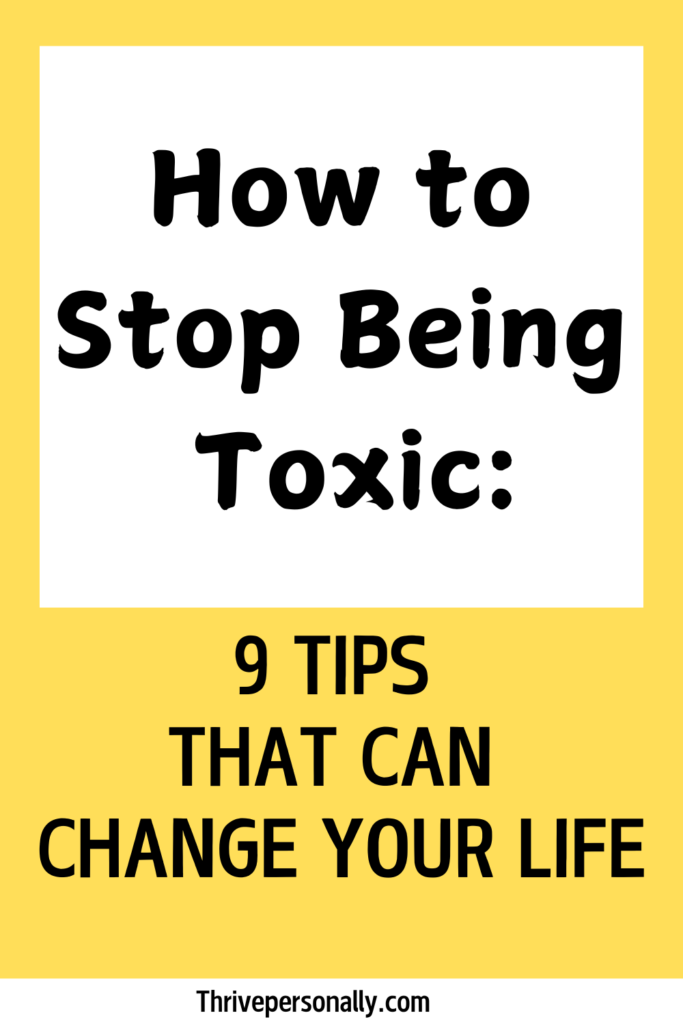Toxic behavior refers to actions or attitudes that cause harm to yourself or those around you. This type of behavior can manifest in various ways, impacting not only your relationships but also your mental well-being.
When you exhibit toxic traits, such as negativity, manipulation, or a lack of empathy, the overall atmosphere in your interactions can become detrimental. Recognizing these behaviors in yourself is the first step toward meaningful change.
10 Tips That Can Change Your Life
1. Reflect on Your Actions

To embark on the journey of personal transformation, it is imperative that you take a step back and reflect on your past actions and interactions with others. Self-reflection serves as a crucial tool in identifying moments when you may have behaved in a toxic manner, allowing you to recognize patterns that require change. This process not only fosters personal growth but also enhances your relationships.
Start by asking yourself some pivotal questions. Consider the last few interactions you had with friends, family, or colleagues. Did you respond with understanding, or did you perhaps let frustration guide your words? By objectively analyzing these exchanges, you can gain insights into your behavior. Think about whether your actions were motivated by jealousy, anger, or a need for control. How did these feelings manifest in your conversations or actions?
Moreover, reflect on the impact of your behavior on those around you. Did your actions cause hurt or push people away from you? Acknowledging the consequences of your toxicity is crucial for making amends and fostering healthier relationships. Be honest with yourself during this process; this honesty will pave the way for meaningful change. It is essential to realize that the first step in altering your behavior is understanding its roots.
Consider keeping a journal to document your reflections. Write down specific instances where you recognize toxic traits, and explore the feelings that prompted your actions. This not only provides clarity but also serves as an ongoing reference that can guide you as you strive for personal development. Over time, you’ll start to recognize the shifts in your behavior, helping you to cultivate a more positive and supportive environment for both yourself and others.
Read Also: 10 Surprising Ways Self-Reflection Can Transform Your Life
2. Take Responsibility for Your Behavior
Taking responsibility for your behavior is a crucial step in your journey towards personal growth and positive change. By recognizing and owning your actions, you demonstrate a willingness to evolve and improve. To begin this process, you must first engage in self-reflection, examining events in which you may have reacted negatively or hurt others. This reflective practice can help you identify patterns in your behavior that may be contributing to a toxic atmosphere.
One effective method for fostering accountability is to acknowledge your mistakes openly. When you hurt someone, you can initiate a conversation to express your understanding of how your actions impacted them. Approach this dialogue with sincerity, making it clear that you value their feelings. It’s essential to avoid making excuses or deflecting blame during these discussions. Instead, focus on how your behavior affected the other person and how you can work towards not repeating it in the future.
When you apologize, aim for genuine remorse. A meaningful apology should convey your understanding of your actions, an acknowledgment of their hurtfulness, and a commitment to change moving forward. You might say something like, “I realize that my words were hurtful, and I am truly sorry for the pain I caused you.” This approach showcases your recognition of the issue at hand and your determination to improve. After your apology, consider offering to make amends, whether through gestures or actions that demonstrate your commitment to positive change.
Read Also: How to Let Go of Your Ego Without Losing Yourself
4. Practice Empathy
To develop your empathy skills, consider these practical exercises that you can implement in your daily life. Firstly, practice active listening. When someone is speaking to you, focus on what they are saying without formulating your response in your mind. This means acknowledging their feelings and reflecting back what you hear, which validates their experience.
Another exercise is to read literature or watch movies from diverse perspectives. By immersing yourself in the experiences of different characters, you can broaden your understanding of various emotional landscapes. Take time to reflect on how these characters might feel and why they react the way they do to certain situations.
Additionally, volunteering or engaging in community service can significantly enhance your empathetic abilities. When you interact with individuals facing struggles, you not only learn about their challenges but also the emotions tied to those experiences. This exposure can deepen your appreciation for their circumstances and inspire a more compassionate worldview.
Read Also: 32 Inspiring Challenge Ideas to Transform Your Life
5. Set Boundaries
Setting boundaries is a crucial step in navigating relationships and creating a healthier environment for yourself and others. Boundaries are the limits you establish to protect your emotional and physical well-being. When you learn to communicate your needs clearly, you not only take care of yourself but also respect others’ limits, fostering healthier interactions.
When you begin to set boundaries, it is essential to start with clear communication. This means being honest about what you need and what behaviors you find unacceptable. For instance, if someone continually disrupts your personal time, express this directly. You might say, “I need some time alone to recharge, and I would appreciate your understanding.” This approach not only articulates your requirement but also conveys respect for the other person’s feelings.
Additionally, it is vital to recognize that boundaries are not just about asserting your needs but also about listening to those of others. When someone expresses their limits, you should engage with empathy. By respecting the boundaries set by others, you are modeling the behavior you wish to see in your own interactions. This reciprocal respect can significantly reduce instances of toxic behavior in relationships.
6. Surround Yourself with Positive People
Your environment plays a significant role in shaping your behavior and mindset. When you surround yourself with positive people, you create an atmosphere that encourages growth, understanding, and support. It is essential to recognize how the individuals you spend time with can influence your thought patterns and emotional well-being. Positive individuals inspire you to view situations through a constructive lens, making it easier for you to overcome challenges in your life.
One of the benefits of surrounding yourself with supportive individuals is their ability to uplift you during difficult times. Whether you are facing personal struggles or professional setbacks, a positive circle will provide the encouragement necessary to navigate these challenges.
Engaging with people who promote positivity also enhances your motivation. When you see others achieving their goals and maintaining a positive demeanor, you are more likely to adopt similar attitudes and behaviors.
To foster a healthier mindset, consider evaluating your current relationships. Identify those who consistently bring negativity or stress into your life and assess whether these connections are worth maintaining. Instead, seek opportunities to connect with individuals who radiate positivity.
You can do this by exploring community groups, attending workshops, or engaging in hobby clubs that align with your interests. Social media platforms can also serve as useful tools for finding like-minded individuals who share your values and aspirations.
It is crucial to actively cultivate your social circle. Make a conscious effort to engage with those who inspire and support you, as this will be instrumental in mitigating toxic behaviors in your own life. When you prioritize interactions with positive individuals, you not only promote your own well-being but also contribute to a collective environment focused on growth and improvement.
7. Learn to Manage Your Emotions
Emotions play a significant role in your daily interactions and overall well-being. Developing effective techniques to manage your emotions can be a transformative experience, alleviating the patterns of toxicity that can emerge from unregulated feelings.
One effective strategy is to practice mindfulness. Mindfulness encourages you to stay present, allowing you to examine your thoughts and feelings without judgment. By engaging in mindfulness exercises, such as meditation or deep-breathing techniques, you can gain better control over your emotional responses and thoughts, reducing impulsive reactions that may contribute to toxic behavior.
In addition to mindfulness, journaling can serve as a valuable tool for emotional processing. By writing down your thoughts and feelings, you can gain insight into the triggers that cause negative emotions. This practice not only fosters self-awareness but also helps you identify patterns in your emotional responses.
Subsequently, you can take proactive steps to address the underlying issues at play. When you articulate your feelings on paper, you create a safe space to explore your emotions, ultimately leading to healthier coping strategies.
Deep breathing exercises are another effective method for managing emotions. When you feel overwhelmed or anxious, taking a moment to breathe deeply can help ground your mind and body. Inhale slowly through your nose, allowing your diaphragm to expand, and then exhale gently through your mouth.
8. Develop Healthy Communication Skills
Effective communication is a cornerstone of healthy relationships and plays a crucial role in preventing toxic behavior. When you prioritize clear expression of your thoughts and feelings, you create an atmosphere of openness and understanding.
To develop healthy communication skills, begin by stating your thoughts assertively but respectfully. For example, instead of saying “You never listen to me,” you can express your feelings by saying, “I feel unheard when my points are overlooked.” This approach fosters constructive dialogue rather than defensiveness.
Listening actively is another vital element in effective communication. This means fully concentrating on the other person’s words, understanding their message, responding thoughtfully, and remembering what was said. You should practice staying present in conversations by eliminating distractions and confirming your understanding through paraphrasing. This step not only shows that you value the other person’s input but also encourages them to be more receptive to your perspective.
When conflicts arise, your ability to resolve them constructively can prevent toxicity from infiltrating your interactions. Embrace a solution-oriented mindset, focusing on collaboration rather than winning an argument. Frame discussions around mutual interests, asking open-ended questions that invite dialogue.
For instance, instead of asserting blame, inquire, “What can we do to resolve this issue together?” This fosters a cooperative spirit and diminishes the likelihood of your communication turning toxic.
Finally, be mindful of your nonverbal cues. Your body language, facial expressions, and tone can communicate more than words. Ensure that your nonverbal signals align with your verbal messages to reinforce trust and understanding.
9. Seek Help if You Need It
Counseling is one such resource that can offer you insights into your behavior and its impact on others. Trained therapists can help you identify patterns contributing to your toxic tendencies and work with you to develop healthier coping mechanisms and communication strategies.
Support groups can also be immensely beneficial. These environments create a safe space where you can share your experiences with others who are facing similar challenges. Engaging with individuals who understand your struggles can help reduce feelings of isolation and stigma.
You may discover that you are not alone in your journey toward self-improvement, and this realization can motivate you to make necessary changes. Many support groups focus on behavior modifications, offering a collective wisdom that can aid your process.
Additionally, online platforms have emerged as practical resources for those seeking help. Whether through digital therapy sessions or virtual support communities, you can find flexible options that fit into your lifestyle. These platforms often allow you to maintain anonymity, making it easier for you to seek help without fear of judgment.
Ultimately, the goal of seeking help is to facilitate your growth and foster essential changes in your behavior. By taking this decisive action, you are prioritizing your well-being and the well-being of those around you. Remember, reaching out for help is a sign of strength, not weakness, and it can be a transformative step toward a healthier, less toxic existence.
Save the the pin for later



